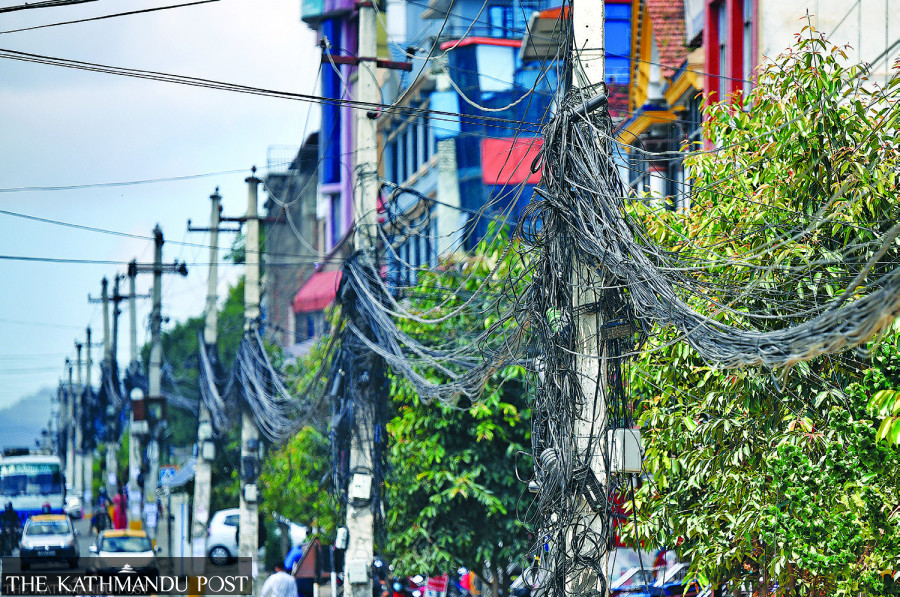Money
Electricity authority urges service providers to share cable wires
The city’s beauty has been marred by mismanagement of wires.
Post Report
The Nepal Electricity Authority on Tuesday urged internet, telephone and cable companies to switch to advanced cable wires so they can share infrastructure and not have to install different cables, which has led to a tangled mess on utility poles.
The state-owned power utility had previously issued an ultimatum to service providers using its utility poles to clear up their outstanding rent payments or their wires would be removed, which expires in two days.
Kulman Ghising, managing director of the Nepal Electricity Authority, said the authority had revised the rentals for using its utility poles. “This has been done not with the intention of charging more money from service providers. We have just published tariff rules for using the authority’s infrastructure.”
He added that the city’s beauty had been marred because of mismanagement of wires. “If service providers use 96 core cable wires which is a system to allow common sharing, it will be cheaper for them and help to bring down internet costs.”
Each internet service provider has been stringing its own wires on every pole and there is no sharing, Ghising said. He added that 95 percent of the cable wires on the poles were not usable. "Many old poles are about to fall down due to the weight of the tangle of wires. To avoid this kind of mess, new cable wires can be connected and shared by everyone, and the cost will also drop.”
Internet service providers said the power utility would be responsible if consumers lost their connections because of its decision to remove the wires from the poles.
“We are not on the side of increasing internet charges, and if the Nepal Electricity Authority cuts the lines and interrupts service, they will be responsible for it,” said Sudhir Parajuli, president of the Internet Service Providers Association of Nepal, during an interaction in Kathmandu on Tuesday.
The Nepal Electricity Authority has said in a notice that it will cut the lines of internet service providers if they do not pay rent for the poles they are using.
"The Nepal Telecommunications Authority and the Ministry of Communication, Information and Technology have been telling internet service providers not to raise their charges as they have discussed the issue with the government," he said.
The electricity poles erected by the Nepal Electricity Authority have been instrumental in the effort to extend internet access to rural parts of the country.
The power utility was charging Rs205 per pole till 2018-19. It plans to revise the tariff on a per km and per pole basis. "The rental will reach Rs750 monthly, which is more than 20 times the original rate," Parajuli said. "As a result, the price of broadband will rise by Rs150 in urban areas and up to Rs300 in rural areas," he said.
“If the authority does not reduce the rent, we will have no option but to increase the charges,” he said. “The increased rent for the poles will also impact the policy of the Digital Nepal Framework under which the government is planning to provide digital access to all for every use.”
He added that fixed broadband service had reached 22 percent of households in Nepal, and the contribution of private sector internet service providers to this achievement is 92 percent. "The internet has also been listed as an essential service by the government," he said.
"Customers have been raising the quality issue of internet connections, and one of the reasons behind the slow connection is the unmanaged wires on the poles," he said.
"The rising price of internet in Nepal is also due to the duopoly situation as the country can import internet from only two companies in India. Due to this, we are paying the highest charges for internet connections as internet service providers are buying internet at $4-5 dollar per mbps,” Parajuli said.
“Though we have purchased internet at the highest rate, we are providing the service at reasonable prices,” he said. "Nine different taxes are imposed on the purchased internet till it reaches the consumer’s home. Service providers pay 44 percent tax to the government due to which internet cannot be provided to the people at a reasonable price," he said.
“The internet price has increased by 10 times in the last five years, and bandwidth consumption has also increased at the same level,” Parajuli said.
Most internet users prefer fixed broadband for fast internet.
Min Prasad Aryal, director of the Nepal Telecommunications Authority, said, "There is a digital divide between urban and rural areas as most of the service providers are urban-centric. We have been trying to settle the dispute over the pole lease issue with the authority, and have informed the government as well,” he said.
Internet service has been established as an essential service, and it should not be interrupted, he added.
“At a time when we are moving ahead to make internet affordable, all have a responsibility to support it,” Aryal said. “The infrastructure of the Nepal Electricity Authority should be shared to help internet service providers, '' he said. "The infrastructure needs to be made shareable by using the latest technology.”




 16.12°C Kathmandu
16.12°C Kathmandu












